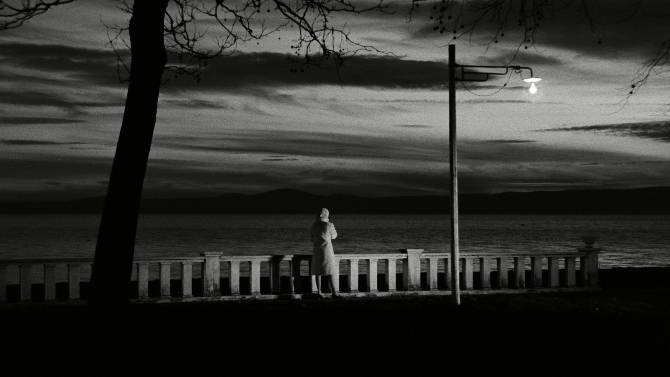An acclaimed author – disenchanted, empty, and broken. . . a man seemingly doomed to repeat his history, returns to a small Italian town that sits upon a lake (during its off season), looking for a maid he once loved – told she has committed suicide, an abstract mystery holds the man transfixed, living a story that could be his newest novel.
In America, titled The Possessed (1965), around the world it is known as The Lady of the Lake, under either moniker, it is a fascinating Italian crossbreed directed by two very different individuals, journeyman Luigi Bazzoni (The Fifth Cord) and Franco Rossellini (his only directorial effort, he is the nephew of famed filmmaker Roberto Rossellini). . . a fascinating combination of lurid pop sensation and art film neo-realism.
Stick with me here, The Possessed is rooted in the middle of numerous sub-genres. . . as the author, Bernard (Peter Baldwin), is making his way to the unnamed lakeside village, he utters, by way of voice-over narration, “I told myself that everything was normal. I was going on vacation. In reality, I was running straight towards disaster” – right out of the film noir play book, it is reminiscent of Billy Wilder’s Double Indemnity, “I couldn’t hear my own footsteps. It was the walk of a dead man”. His character, that of a nihilistic, detective-like protagonist, centres the mystery, echoing the sentiments of director Bazzoni, while its style is that of the abstract, more precisely known as surrealism. . . think Fellini, Bergman, Antonini, Buñuel, and Polanski, a dreamscape of nightmares and hallucinations, structured like Wild Strawberries or Repulsion – Rossellini’s evident touch. Yet, there is so much more. . . feeding off of a 1930s true crime story (that was adapted from Giovanni Comisso’s novel based on the events), it at times feels like pure Alfred Hitchcock, think Psycho (are you getting Vertigo yet?), while all of this comes together to make for a precursor to the giallo, those sensationally lurid, intensely edgy motion pictures that would soon be dominating Italian cinemas a few years later. And, let us not forget the uncanny nature of Edgar Allan Poe’s work, for his stories always influence this type of feature. So, you may ask, what does all of this make? A Frankenstein-monster-like film, part horror/thriller, part complex arthouse haunting fantasy, making it a hybrid all its own.
Filled with intriguing thoughts, some are there to simply linger in your mind (haunting your psyche), while others fit within the red herring portion of this mystery. Looking at the film’s alternate title, what does ‘lady of the lake’ mean? Learning that hidden beneath the striking blue surface lies a former town, it seems to hint at a covered past, a history that can be seen through the ripples but never truly reached or understood. Then there is the story of several coats, causing memories to come flowing back to Bernard. . . a jacket that was once his love’s, while another garment leaves him with other questions revolving around the ever growing conundrum. There is also an unread note that disappears. Photos also play a part. . . Bernard has his own, while he is shown another one soon after – as they say, a picture is worth a thousand words, sadly, none of them are the answer to the growing secrets (though they do add to them).
Then, there are the people. Bernard’s only true ally is his photographer friend (Pier Giovanni Anchisi), who, as time goes on, slowly tries to extricate himself from the dangerous possible crime (for he believes that the maid’s death was no suicide). There is also the maid’s father (Bruno Scipioni), a drunken derelict living somewhere in the mountains (another person wary of saying too much), while the seemingly friendly hotel staff may have something to hide. . . from the patriarch, Enrico (Salvo Randone), and his right-hand, daughter Irma (Valentina Cortese), to their butcher son, Mario (Philippe Leroy), and his depressed foreign bride, Adriana (Pia Lindström – first daughter of Ingrid Bergman), nothing is as it seems.
For the farther we journey down the proverbial rabbit hole, the less clear things become. Soon, the author has developed a flu, a haze that echoes his fluid thoughts. Present turns to past, an eye spying at cold lovemaking, reality turns out to be dream, a meeting on the lake that is only of the mind?. . . if this all sounds cryptic, it is, its unique mix developing a spellbinding trance for the viewer. Even the hotel in which the man stays for the extended time is part of this dynamic structure, for it is a labyrinthine building with cracks in its door, and people round every corner. We may even start to wonder if Bernard even wants to solve the supposed-case, for his photographer friend ironically reviews his last hit book in this way, “it seemed to me you were afraid of not finding an answer for everything”.
Filmed in striking black and white (masterful cinematography from Leonida Barboni – the noiresque shadow and light adding to the multi-faceted mystery), it is quite easy to say that The Possessed possesses you – its visual style, pure beauty; the performances, rich; the story, engrossing. The music must also be mentioned, composed by director Franco’s father Renzo Rossellini, each note reverberates with what is seen on screen – a misapprehension in each phrasing, suspenseful lure in each theme, it aptly adding to the suspense. So, take a trip down memory lane, you may just be surprised by what you find. . . pregnant pause. . . blackmail is only the suspenseful start of the story.
Can be watched in either Italian with English subtitles or in dubbed English




